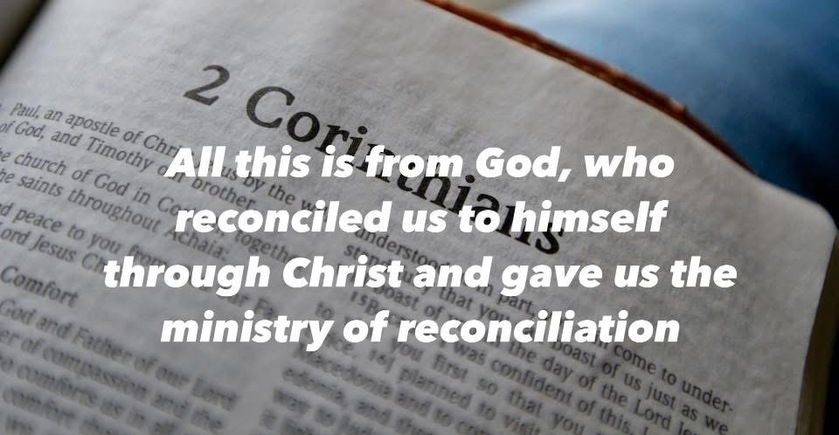Veils of Vanity: When Tradition’s Pride Clashes with Scripture’s Sword
Why does evangelism make people come to faith? How is it that the Word of God can change lives, giving people hope, soften hearts, and transform minds? Let's take a look at how the Word of God works and how sometimes spiritual forces are at odds with it's work.
Proverbs 30:5
"Every word of God proves true; he is a shield to those who take refuge in him."
To begin with, we need to understand that there's always an end. An end of everything. Even Jesus ended his human life, saying "it is finished". There is an end to everything. And there's an end to rebellion, doubting, resistance, and violence against God and his people. Everything ends with God's will having His way. But before there can be an end there needs to be a beginning.
Evangelism plants the seeds of faith because faith itself is birthed from hearing the message of Christ. It's a gift from God, He's the source. Romans 10:17 declares, "So faith comes from hearing, and hearing through the word of Christ." When we evangelize, we’re not relying on our eloquence or persuasion; we’re unleashing the inherent power of the Gospel, which Paul describes in Romans 1:16 as "the power of God for salvation to everyone who believes." So, right now there is no judgement. Right now, we are in the age of Grace. Jesus’ cry of "It is finished" on the cross (John 19:30) marked the ultimate end to the power of sin and death, opening the door for transformation through His Word. This isn’t just closure, it’s the gateway to new beginnings, where the Gospel ends our separation from God and births eternal life in those who take Jesus at his word.
And so, evangelism draws people to faith because it confronts the end of self-reliance and introduces the living Word of Christ. Faith arises from hearing the message, and that hearing pierces through resistance like a divine arrow. The Gospel isn’t human invention; it’s God’s power unleashed, ending the reign of darkness in a heart and igniting belief. When shared, it softens rebellion, as seen in countless lives where a simple proclamation ended years of doubt. And we see this happening all the time around us. If you're born again you probably recall that time when you finally came to your end. And you recall how those around you reacted to your transformation.
They remembered you when you were on the streets, homeless, out of your mind with drugs. You were sleeping around, circling the drain. You hit rock bottom and seemed to be digging even deeper. They remember when you cheated on their mother. They remember when you lied, stole, and bore false testimony against a friend. They haven't forgotten that thing you did. They judged you then and they're judging you now based on what they remember about you then. So, for many there will be questions and doubts. And you may need to find refuge elsewhere.
This echoes how evangelism ends our isolation and births community in Christ. Evangelism, through hearing and community, ended your search and began a new and true belonging for you. Jesus said, "come on in", you've judged yourself, they've judged you, and now I'm not judging you, instead I'm going to take your place in that judgement. Proverbs 30:5 assures God's truth shields those who find refuge in it, ending vulnerability to the judgements of the world. It gives hope by revealing God’s promises amid those trials. It softens hearts through conviction (Ezekiel 36:26) and transforms minds by aligning thoughts with Christ’s (Romans 12:2). This isn’t self-help; the Holy Spirit interprets God's word and applies it, unleashing power to change souls. It's all very real.
Okay, but what about all these different forms of God's "word" going around? I've been reading, listening, and watching the word go out and I've got to tell you, there are a lot of crazy things being cooked up by these Christians.
The Word of God is unchanging and powerful, yet its proclamation through flawed humans can sometimes veer into confusion, excess, or outright distortion. You’ve been immersing yourself in various forms; books, podcasts, videos, sermons, and noticing the "crazy things" bubbling up. That’s wise; it echoes the call to discernment we’ve been circling back to.
1 John 4:1
"Beloved, do not believe every spirit, but test the spirits to see whether they are from God, because many false prophets have gone out into the world."
At its core, the "Word of God" is the inspired Scripture, living, active, and sufficient for equipping us. It’s the benchmark that "proves true" as Proverbs 30:5 declares, shielding us from deception. Preached sermons, written books, online content, songs, and even personal testimonies can be vessels for the Holy Spirit to soften hearts, give hope, and renew minds. Yet, when they drift from biblical fidelity, they can become "crazy" distortions, human inventions masquerading as divine truth. It's mix of zeal without knowledge, cultural pressures, and the enemy’s schemes to sow division. That's right, it's spiritual warfare. We see it all the time replayed daily online, misguided evangelism tactics, chaotic worship, prophetic excesses, political and doctrinal twists, and cultural and superstitious practices.
And we can see these things and say to ourselves that these Christians are crazy, out of their minds, and stay far away from them. These examples aren’t exhaustive, but they show how the Word can be "cooked up" into something unrecognizable, possibly ending in confusion rather than conviction. Yet, they’re also opportunities to test:
Does it align with Scripture?
Does it exalt Christ and produce fruit like hope, softened hearts, and transformed minds?
In our post-Christian era, some chase relevance by blending the Gospel with politics, entertainment, or self-help, leading to excesses that repel rather than draw. Oh sure, it'll draw crowds, but if it's not of The Spirit, it will not transform hearts and minds. Remember, the true Word confronts self-reliance and ends rebellion, as Jesus did on the cross. Anything else is noise. So, we don't simply reject questionable expressions of faith, we instead hold on tightly to what is good.
1 Thessalonians 5:20-21
"Do not despise prophecies, but test everything; hold fast what is good."
In your born-again journey, recall how the pure Gospel ended your old life and birthed new belonging, despite others’ judgments. Jesus took that judgment, remember what Jesus said...
John 3:17-18
"For God did not send his Son into the world to condemn the world, but in order that the world might be saved through him. Whoever believes in him is not condemned, but whoever does not believe is condemned already, because he has not believed in the name of the only Son of God."
The Holy Spirit applies the true Word to change us; not with hype, politics, or manipulation, but with faith. Amid all the noise, cling to Scripture: Study it daily like the Bereans (Acts 17:11), pray for discernment, and surround yourself with communities that prioritize biblical truth over trends. If a teaching feels "crazy," test it against the Word, it’s your shield.
Let's Try the Spirits:
Amid all the online noise, one recent example is the rise of "performative orthodoxy" among young Christian influencers, particularly in Catholic and Orthodox circles. This isn’t about genuine devotion but a stylized display of faith, think aesthetic posts, dramatic rituals, and rigid rule-following that prioritizes online clout over heart transformation. It’s flashy, viral, and often veers into spiritual elitism, where influencers parade “traditional” practices like they’re a fashion statement, drawing followers into a show rather than deeper communion with Christ.
You've seen the threads and posts highlighting this, concerns about how this "revival" feels more like irrational self-identification as Christian without the committed actions of past awakenings, blending cultural vibes with vague spirituality. This trend isn’t new in essence; think Pharisees prioritizing appearances, but on X, it’s amplified by algorithms rewarding their spectacle, leading to a surge in irrationalism masked as revival.
So, how do we apply God’s shielding here, as Proverbs 30:5 promises?
His Word "proves true" and protects those who take refuge in it, ending vulnerability to these deceptions.
Test it against Scripture:
Does this performative faith exalt Christ or the influencer?
Colossians 2:18
"Let no one disqualify you, insisting on asceticism and worship of angels, going on in detail about visions, puffed up without reason by his sensuous mind"
True orthodoxy softens hearts toward God and others (Ezekiel 36:26), not hardening them into elitism. Are they parading around in their prideful displays? Has their orthodoxy transformed their minds through renewal? The Holy Spirit applies the Word to convict and guide, not to entertain, and not to pump up. It's food that feeds the strong and milk that sustains the weak. It's as relevant as tomorrow's headlines. And we celebrate the Word of the Bible, what it says, what it means, and what it does in our lives.
And so, Romans 12:2
"Do not be conformed to this world, but be transformed by the renewal of your mind, that by testing you may discern what is the will of God, what is good and acceptable and perfect."
Dive into unfiltered Scripture, pray for discernment, and seek communities rooted in humility, not hype and the traditions of men. The test is simple, does their tradition fit the scripture without pushing in their own direction.
What do I mean by "their own direction"? Pride often masquerades as piety, elevating human traditions to a pedestal where they claim an irreplaceable "certificate of authenticity" that supposedly outshines the simple, and sufficient Word of God in a believer’s hands. Theirs is a subtle shift, from refuge in Scripture to reliance on rituals, aesthetics, and communal validation. Which can foster spiritual elitism, making faith feel exclusive rather than inviting. this doesn’t align with the Gospel’s call to humility and transformation through the living Word, which pierces pride and softens hearts.
Hebrews 4:12
"For the word of God is living and active, sharper than any two-edged sword, piercing to the division of soul and of spirit, of joints and of marrow, and discerning the thoughts and intentions of the heart."
The "certificate" of faith isn’t in orthodoxy’s trappings—beautiful as some may be—but in Christ alone, authenticated by His Word that "proves true" and protects those who take refuge in it. When people insist traditions hold unreplicable authority over individuals with a Bible, it risks commodifying faith, turning it into a performance rather than a personal encounter with the Holy Spirit who applies Scripture to renew minds. And that's exactly what we see every time. In the past believers were murdered for not giving up their personal Bibles. And today on X, this pride-fueled dynamic shows up vividly in discussions around performative orthodoxy. Today young influencers in Catholic and Orthodox spaces prioritize "looking holy and steadfast" for glory, confusing controversy with true conviction and lacking compassion, essentially a haughty display that forgets obedience is between you and God. It's performative traditionalism commodifying religion as an identity rather than a lived humility. You can even find young people LARPing (live-action role-playing) as guardians of ancient virtues like hierarchy and faith, romanticizing them as the "last gasp" against modern filth. But this draw to Eastern Orthodoxy or Catholicism’s antiquity is a poor substitute for the reverence of apostolic Christianity found in Scripture. It's a milquetoast modern faith, filled with the milk of pride in aesthetics over the Bible’s power. It's half-hearted tradition-following for social acceptability, not genuine faith in grounded in God's shielding Word.
By insisting on a "certificate of authenticity" locked in human rituals or aesthetics, this trend subtly shifts allegiance from Christ's Word to a commodified version of faith.
The True Test:
Does this faith exalt Christ or the influencer?
Colossians 2:18 warns against those "puffed up without reason by his sensuous mind," insisting on asceticism, visions, or tradition's details that inflate ego over humility. The Scripture urges discernment against social media figures turning faith into pretense, where aesthetics and rituals trump biblical renewal. It's a call to keep watch for romanticizing hierarchy and faith as a last gasp against modernity but perverting them into identity markers rather than lived humility grounded in Scripture.
True orthodoxy, as Romans 12:2 instructs, transforms by mind renewal, enabling discernment of God’s will, not conformity to worldly hype or man-made traditions, often selling crude understandings while attacking (debating) other faiths, damaging inquiry with mocking and exalting self over Christ’s unity. As I said earlier, history underscores this. Believers martyred for clinging to personal Bibles refusing to yield Scripture’s sufficiency to ecclesiastical gatekeepers. Today, the same dynamic plays out online, where "performative traditionalism" half-heartedly following the trend for social acceptability, not genuine refuge in the Word.
Proverbs 30:5’s shield activates when we dive into Scripture, pray for discernment, and seek humble communities.
The test is straightforward: Does the tradition align with the Bible without twisting it? If it commodifies faith or fosters exclusivity, reject it. Take the good, leave the bad. And always hold fast in Christ alone, no unreplicable "certificate" needed beyond His grace. No orthodox gatekeepers hold that grace in their exclusive grip. Genuine encounters exalt Christ, softening hearts and birthing hope, while performative ones always harden into division.
Prayer:
Heavenly Father, shield us with Your unchanging Word, humbling our hearts and piercing through pride’s deceptions. Grant us discernment to exalt Christ alone, softening us for genuine renewal and refuge in Your promises.
In Jesus’ Holy name, Amen.




















